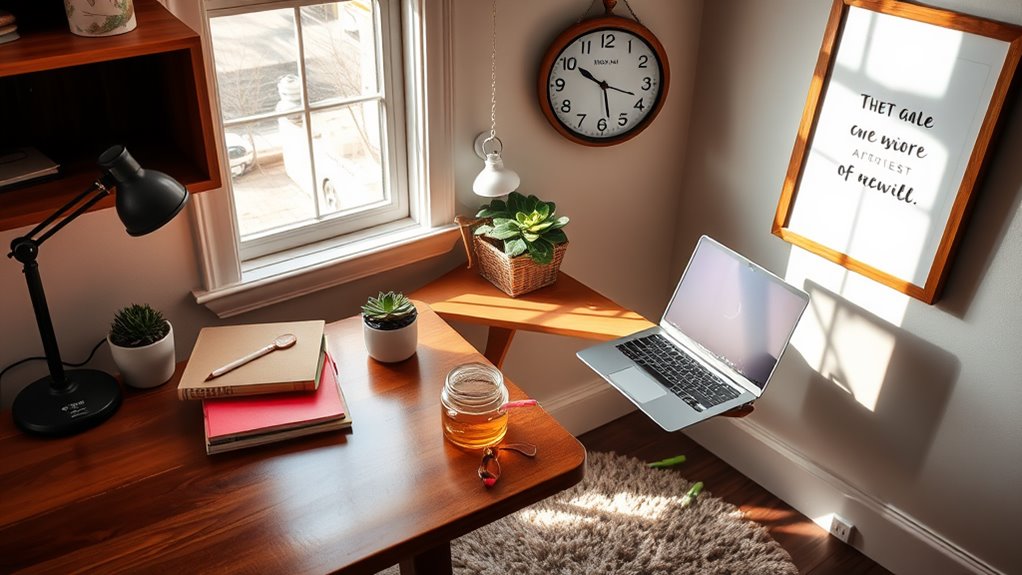Study Routines for Students Who Want Top Grades!
To achieve top grades, you’ve got to establish effective study routines that match your learning style. Start by creating a consistent schedule and blocking out specific study times. Use techniques like the Pomodoro method—25 minutes of focused study followed by a 5-minute break. Keep your workspace organized and free of distractions to enhance concentration. Tailor your tools, like flashcards or apps, to reinforce your learning. Set clear goals and reward yourself for hitting targets. With the right mix of methods, you’ll see improvements. There’s plenty more to explore for crafting that perfect routine!
Understanding Your Learning Style
As you embark on your academic journey, understanding your learning style can significantly impact your study routines. Everyone processes information differently, and recognizing whether you’re a visual, auditory, or kinesthetic learner helps tailor your approach. If you’re a visual learner, you might find that using diagrams, charts, or color-coded notes enhances your retention. On the other hand, if you absorb information better through listening, consider recording lectures or using audiobooks to reinforce your understanding.
If you’re a kinesthetic learner, hands-on activities, like conducting experiments or using flashcards, can make studying more engaging. Experiment with various methods to identify what resonates with you; this discovery can transform your study sessions from mundane to effective.
Once you grasp your learning style, you can incorporate techniques that align with it. This not only boosts your confidence but also optimizes your time and effort spent on studying. Tailoring your study sessions to fit how you learn best can lead to better comprehension and improved grades. Embrace the process, and don’t hesitate to adjust your methods as you discover what works best for you!
Setting Up a Study Schedule
Creating a study schedule can be your secret weapon for academic success. It helps you organize your time effectively, ensuring you cover all your subjects without the last-minute rush. Start by assessing your weekly commitments. Identify fixed obligations like classes, work, and extracurricular activities.
Once you’ve mapped out your non-negotiables, block out specific times for studying. Aim for consistency; studying at the same time each day can strengthen your routine. Be realistic about how much time you can dedicate to each subject, considering your strengths and weaknesses.
When you allocate study sessions, balance them with breaks to maintain focus and prevent burnout. For instance, use techniques like the Pomodoro method—study for 25 minutes, then take a 5-minute break.
Lastly, don’t forget to review your schedule regularly. Adjust it based on your progress and upcoming exams or assignments. Make it a habit to stick to your schedule, but allow flexibility when needed. By setting up a study schedule, you’re not just managing your time; you’re actively creating a pathway to achieving those top grades you desire.
Effective Time Management Techniques
How can you make the most of your study time? Effective time management is key to maximizing your productivity. Start by prioritizing your tasks. Identify what’s urgent and important, then tackle those first. Break larger projects into smaller, manageable chunks. This approach helps you avoid feeling overwhelmed and allows you to celebrate small victories along the way.
Next, use a timer to implement the Pomodoro Technique. Study for 25 minutes, then take a 5-minute break. This keeps your mind fresh and focused. Don’t forget to schedule longer breaks after completing several Pomodoros to recharge fully.
Also, minimize distractions. Turn off notifications on your devices and create a dedicated study space. You’ll find it easier to concentrate when you’re in an environment designed for focus.
Lastly, review your progress at the end of each week. Assess what worked and what didn’t, then adjust your strategies accordingly. Being flexible and open to change will help you refine your process over time. By applying these effective time management techniques, you’ll enhance your study sessions and be well on your way to achieving those top grades!
Creating a Productive Study Environment
To boost your study effectiveness, start by decluttering your workspace, as a tidy area can help clear your mind. Next, make sure your lighting and comfort levels are optimized to keep you focused and energized. Finally, minimize distractions to create an environment where you can truly concentrate on your studies.
Declutter Your Workspace
Clearing away clutter from your workspace can significantly boost your focus and productivity. When you sit down to study, a tidy environment helps you concentrate on the task at hand instead of being distracted by unnecessary items. Start by removing everything from your desk and only put back what you need. This could include your textbooks, notebooks, and writing tools.
Next, consider organizing these essential items neatly. Use trays, folders, or drawer organizers to keep your materials in order. This way, you won’t waste time searching for things when you’re in the middle of studying.
Also, take a moment to evaluate your digital workspace. Clear your desktop of irrelevant files and organize your digital folders. A clean digital space can be just as important as a physical one.
Finally, make it a habit to declutter regularly. Set aside a few minutes at the end of each study session to tidy up. By maintaining a clean workspace, you’ll create a more inviting study environment that encourages productivity and helps you achieve those top grades you’re aiming for!
Optimize Lighting and Comfort
Creating a study environment that maximizes your productivity hinges on optimizing both lighting and comfort. Good lighting reduces eye strain and helps you stay alert. Natural light is best, so try to position your study area near a window. If natural light isn’t an option, use daylight bulbs that imitate sunlight. Avoid harsh overhead lights; instead, opt for desk lamps that can provide focused illumination.
Comfort is equally important. Your chair should support your back, and your desk should be at a height that allows your arms to rest comfortably. Adjust your chair and desk to maintain a proper posture, reducing fatigue during long study sessions. Consider using a cushion or a footrest if needed.
Temperature matters too. A room that’s too hot or too cold can distract you from your studies. Aim for a comfortable temperature that keeps you focused. Finally, personalize your environment with items that inspire you, like motivational quotes or plants, but keep it minimal to avoid clutter. By optimizing your lighting and comfort, you’ll create a conducive study space that enhances your focus and productivity.
Minimize Distractions Effectively
Focus is essential for effective studying, and minimizing distractions can significantly enhance your productivity. Creating a study environment that fosters concentration is crucial. Here are some strategies to help you eliminate distractions:
- Designate a Study Space****: Choose a specific area where you’ll study consistently. This space should be free from interruptions and clutter.
- Silence Notifications: Turn off your phone or use “Do Not Disturb” mode. Notifications can break your concentration and lead to time lost in distractions.
- Limit Background Noise****: If silence isn’t an option, consider using noise-canceling headphones or listening to instrumental music. This can help drown out distracting sounds.
- Set Clear Boundaries****: Inform family or roommates when you’re studying and ask them to respect your quiet time. Clear communication can reduce interruptions.
- Use the Pomodoro Technique****: Break your study time into focused intervals, like 25 minutes of studying followed by a 5-minute break. This method can keep you engaged without overwhelming you.
Utilizing Study Tools and Resources
To boost your study efficiency, it’s crucial to tap into essential study apps and resourceful online platforms. These tools can streamline your learning process and help you stay organized. By leveraging technology, you’ll find studying can be more engaging and effective.
Essential Study Apps
In today’s fast-paced academic environment, leveraging the right study apps can make a world of difference in your learning journey. With so many options available, you can easily find tools that cater to your specific needs and help you maximize your study time. Here are five essential study apps you shouldn’t overlook:
- Quizlet: Create flashcards and study sets to reinforce your memory and test your knowledge.
- Evernote: Organize your notes, to-do lists, and research in one place for easy access and review.
- Forest: Stay focused by planting virtual trees as you work; if you exit the app, your tree dies.
- Trello: Manage your projects and deadlines visually, breaking tasks down into manageable steps.
- Khan Academy: Access a wealth of resources, including video lessons and practice exercises, to supplement your studies.
Resourceful Online Platforms
Online platforms have become essential study hubs, offering a wealth of resources that can enhance your learning experience. With just a few clicks, you can access a variety of tools tailored to your study needs. Websites like Khan Academy and Coursera provide free courses on countless topics, allowing you to deepen your understanding outside the classroom.
You can also utilize platforms like Quizlet for flashcards and quizzes, which are perfect for memorizing key concepts. Engaging with interactive materials helps reinforce your knowledge and keeps studying enjoyable. Don’t forget about YouTube; countless educators share insightful tutorials and lectures that can clarify complex subjects.
For collaboration, consider using Google Docs or Microsoft Teams. These tools enable you to work with classmates on group projects in real-time, making the process more efficient. Additionally, platforms like Grammarly can help refine your writing, ensuring your essays are polished and error-free.
Finally, always explore educational forums like Reddit or Stack Exchange. They’re great for asking questions and connecting with others who share your academic interests. By tapping into these resourceful online platforms, you’ll boost your study routine and set yourself up for top grades!
Maintaining Motivation and Consistency
Staying motivated and consistent in your study routine can make all the difference in achieving top grades. It’s easy to lose focus, especially when distractions abound. To help you stay on track, consider implementing these strategies:
- Set Specific Goals****: Break your study sessions into manageable, achievable goals. This gives you a clear target to aim for and a sense of accomplishment as you complete each one.
- Create a Study Schedule****: Designate specific times each day for studying. Consistency helps solidify your routine and makes it easier to stick to your plan.
- Stay Organized: Keep your study materials neat and accessible. An organized workspace can reduce stress and help you focus better.
- Reward Yourself: After completing your goals, treat yourself to something you enjoy. Whether it’s a snack, a break, or time with friends, rewards can boost your motivation.
- Connect with Study Partners****: Collaborating with peers can provide support and keep you accountable. Discussing material with others can deepen your understanding and make studying more enjoyable.
Frequently Asked Questions
How Can I Improve My Focus During Study Sessions?
To improve your focus during study sessions, try breaking tasks into smaller chunks, eliminating distractions, and setting specific goals. Also, consider using techniques like the Pomodoro method to maintain motivation and sharp concentration.
What Should I Do if I Feel Overwhelmed by Studying?
When you feel overwhelmed by studying, take a break, breathe deeply, and prioritize tasks. Break your workload into smaller chunks, and tackle them one at a time. Remember, it’s okay to ask for help.
Are There Specific Study Techniques for Different Subjects?
Yes, specific study techniques vary by subject. For math, practice problems work wonders; for history, timelines help you visualize events. Experiment with methods like flashcards for vocab or diagrams for science to find what suits you best.
How Can I Balance Studying With Extracurricular Activities?
To balance studying with extracurricular activities, prioritize your tasks, create a schedule, and set specific goals. Don’t forget to allocate time for relaxation; it’ll help you stay focused and energized for both commitments.
What Are Some Tips for Preparing for Exams Effectively?
To prepare for exams effectively, you should create a study schedule, break materials into manageable sections, practice with past papers, and take regular breaks. Don’t forget to stay healthy and get enough sleep for optimal performance!




